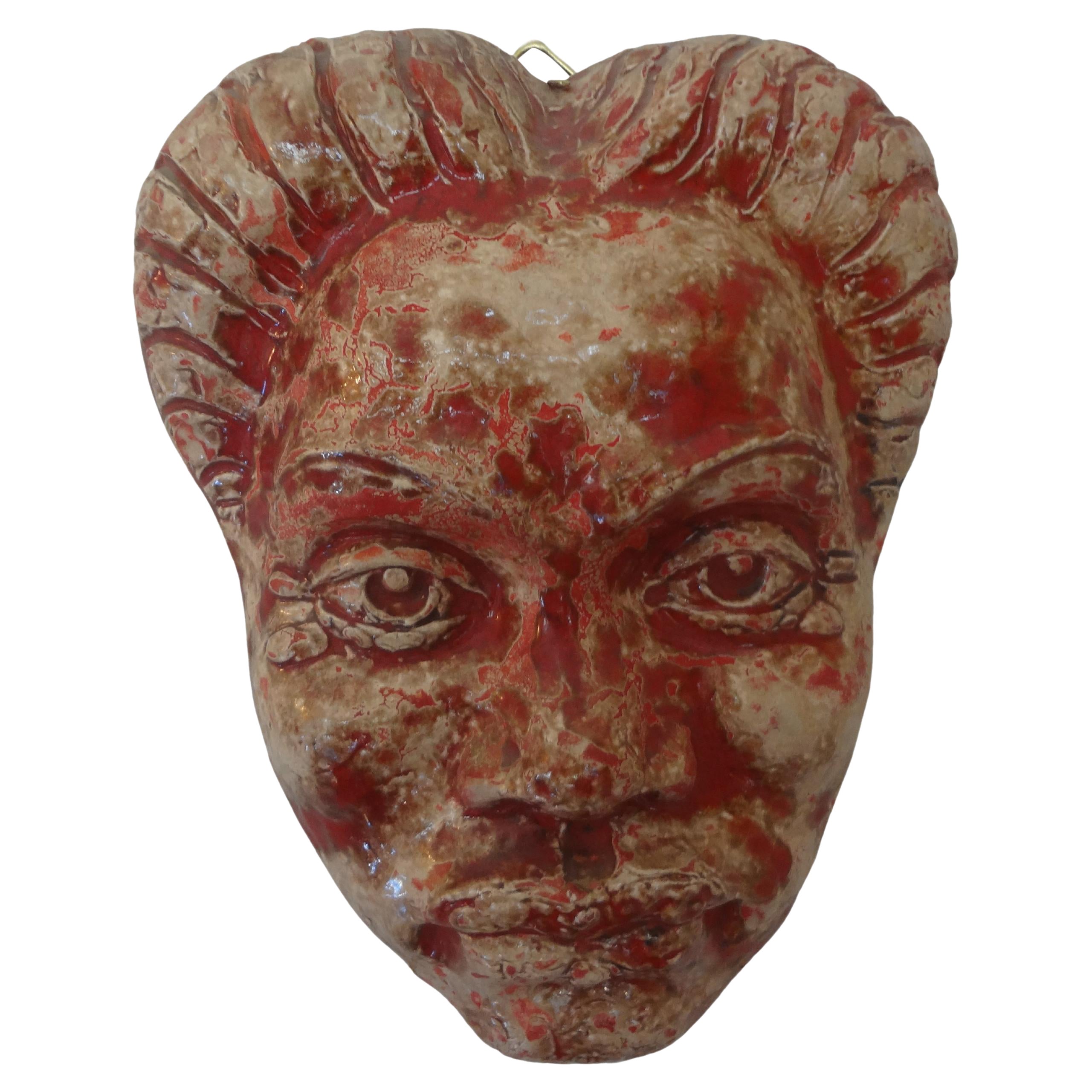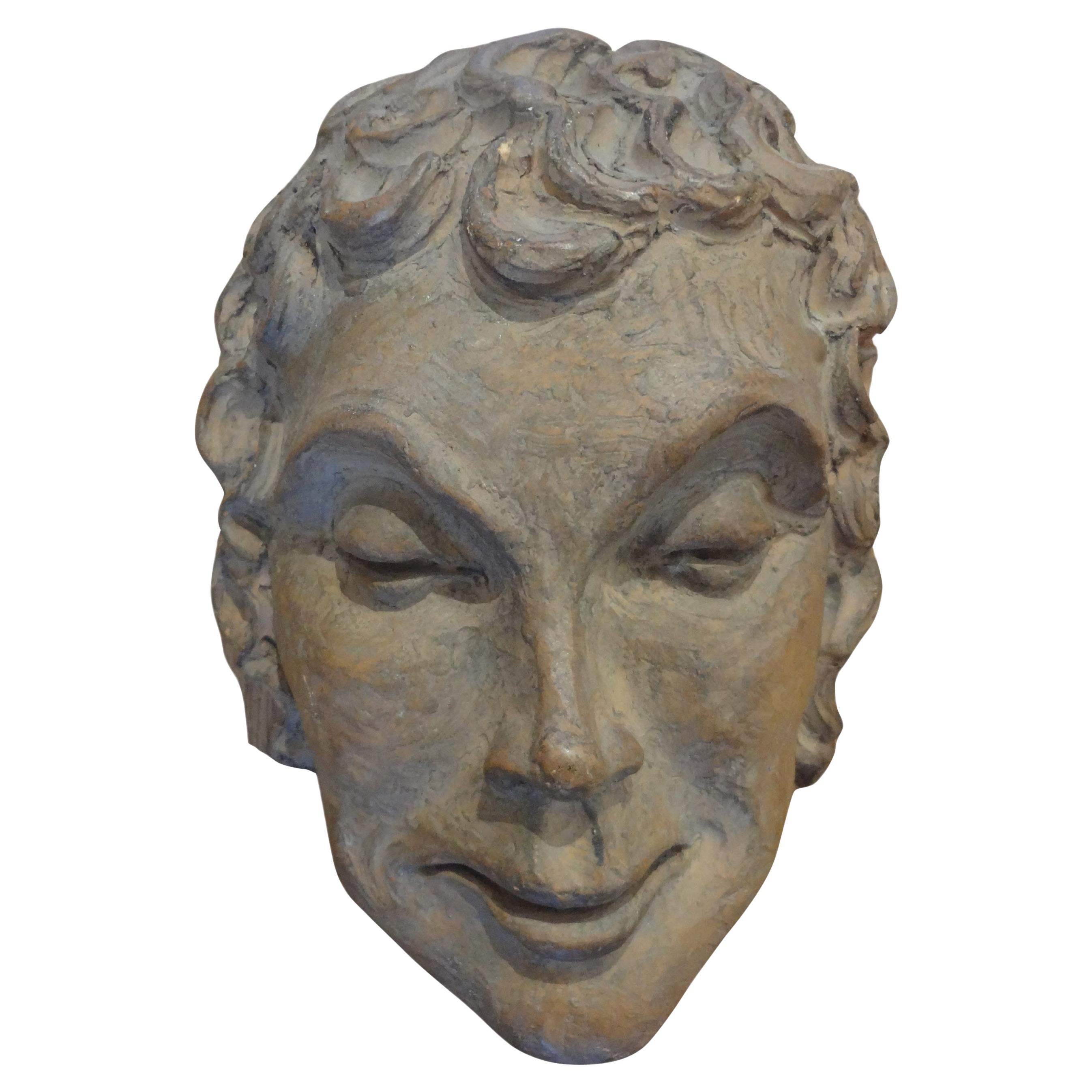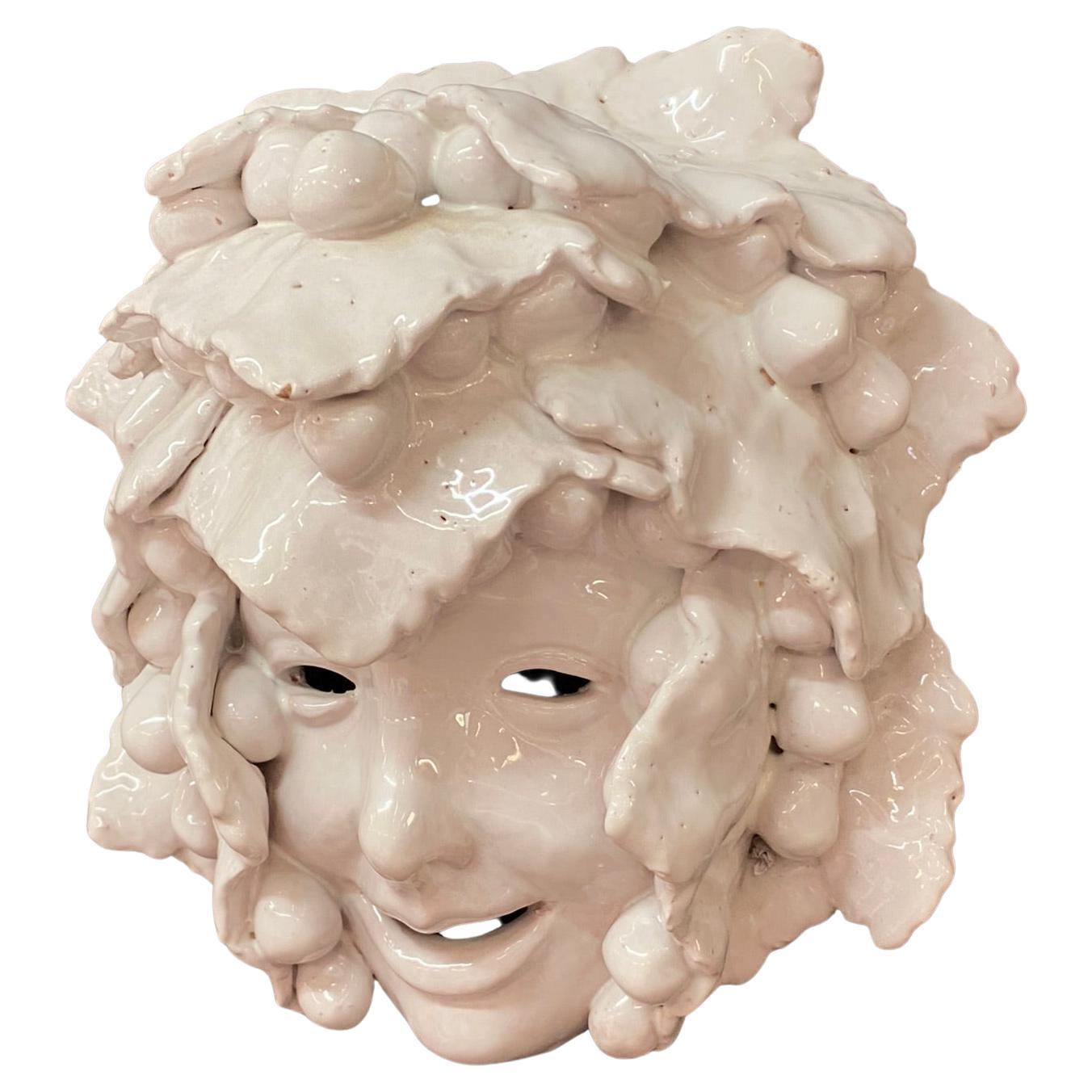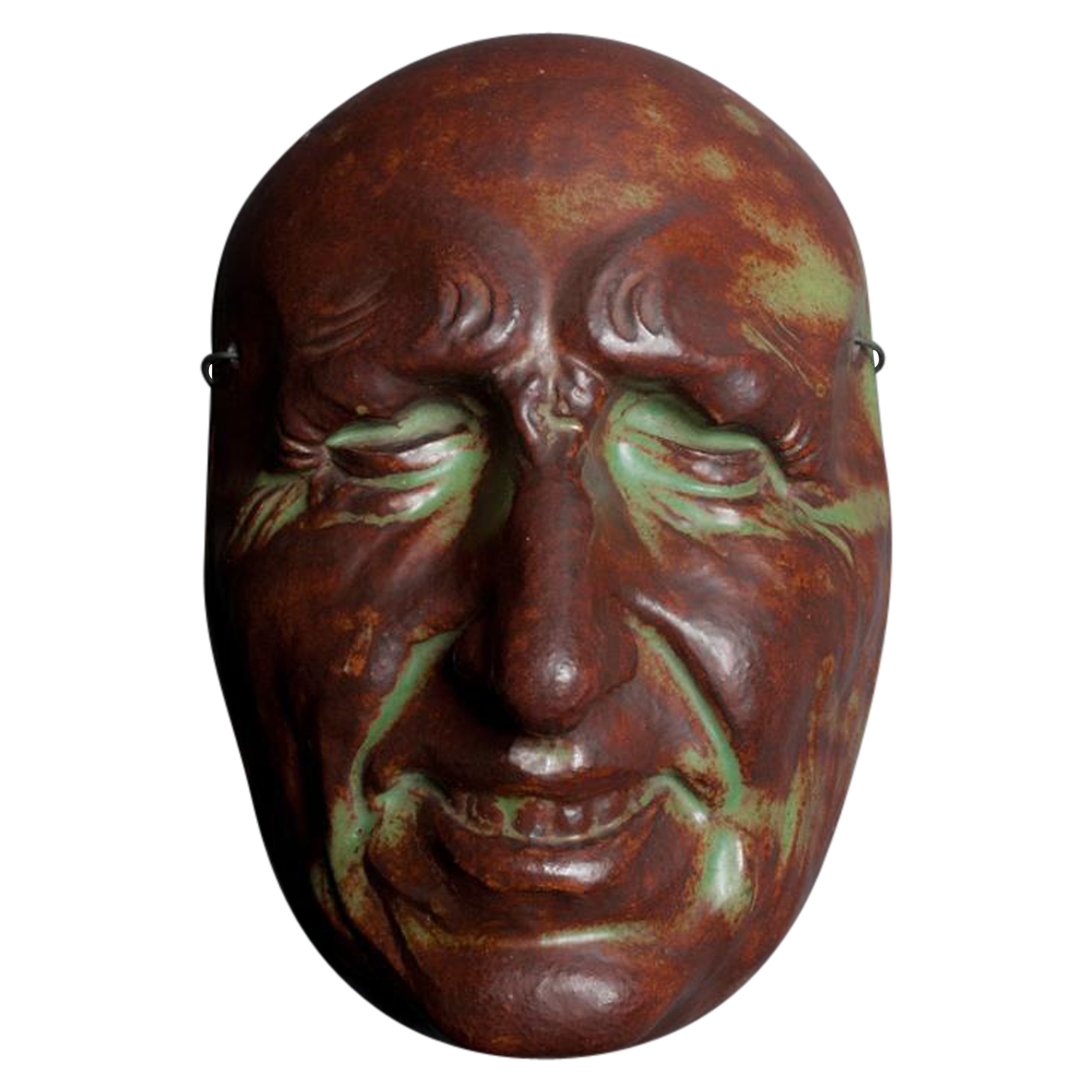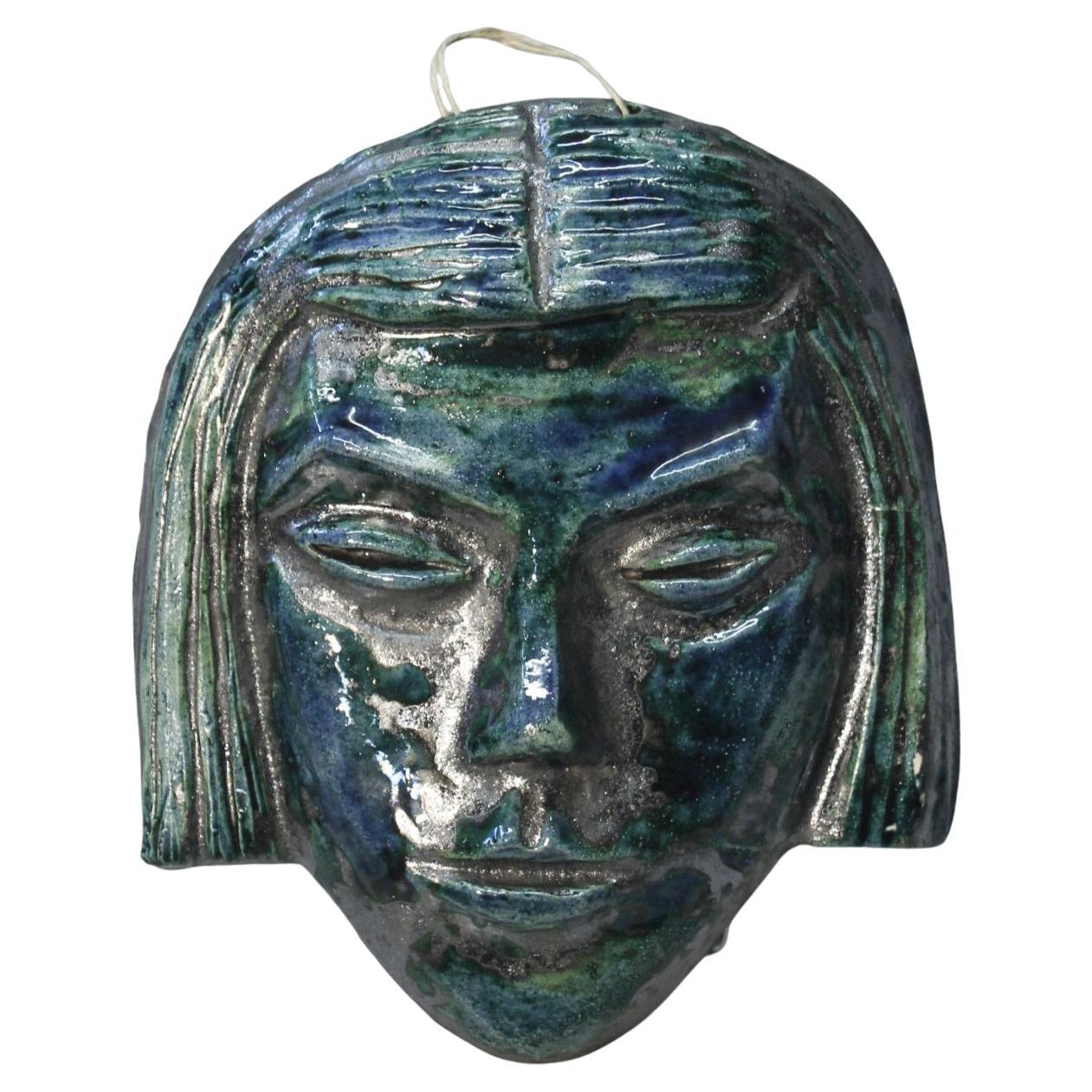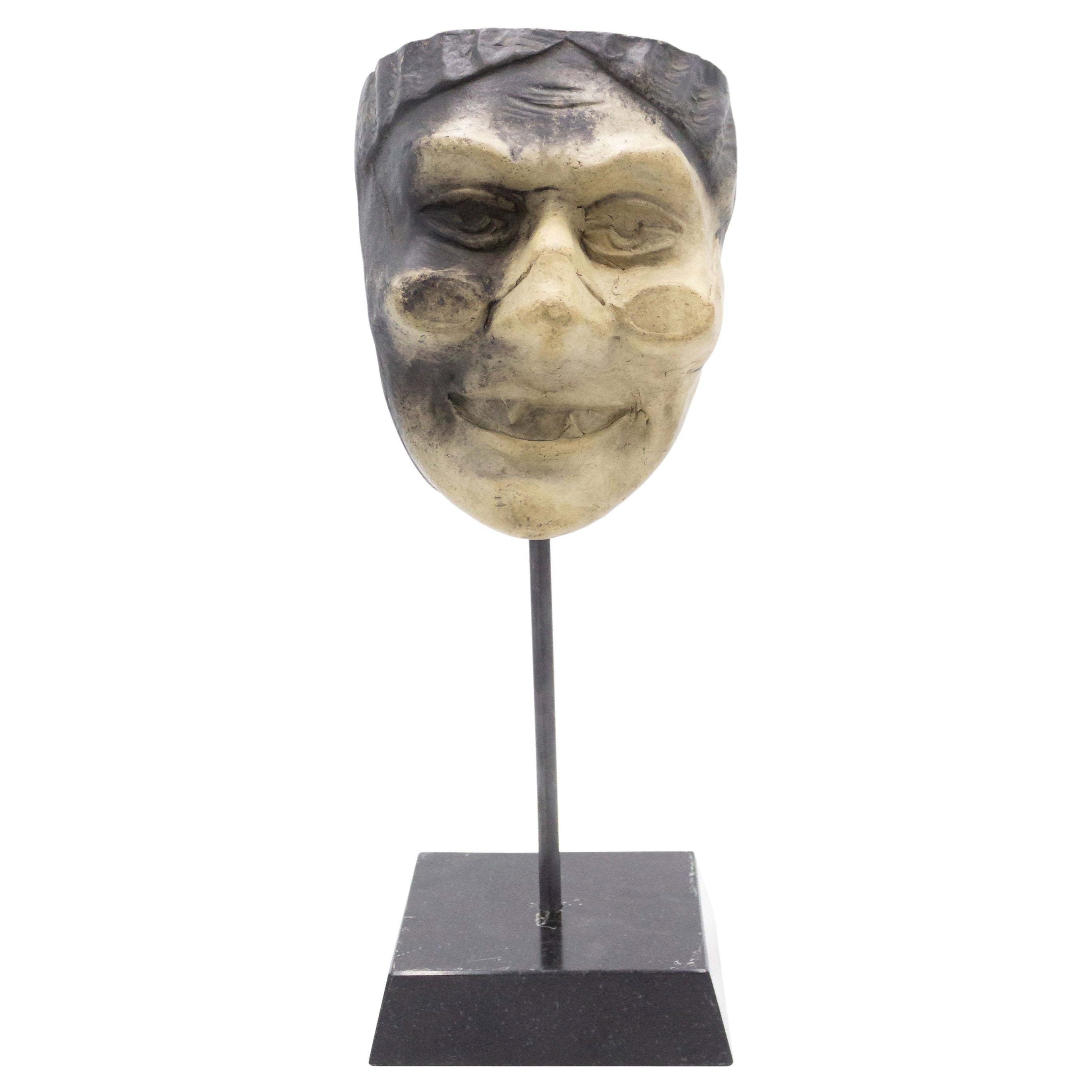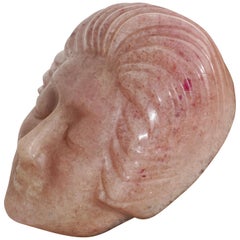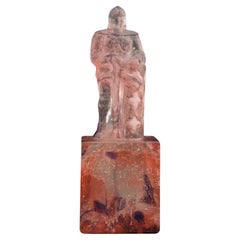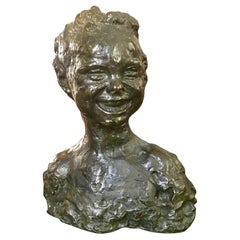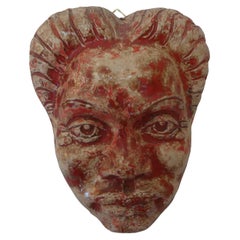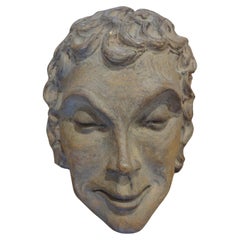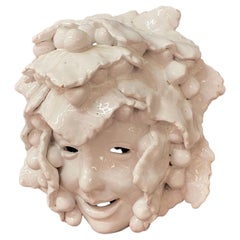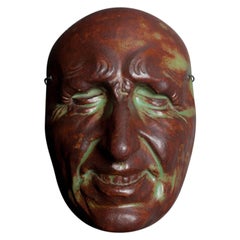Items Similar to Francois Emile Decorchemont Pate De Verre Mask of Pan
Want more images or videos?
Request additional images or videos from the seller
1 of 8
Francois Emile Decorchemont Pate De Verre Mask of Pan
$8,500
£6,423.17
€7,417.19
CA$11,877.47
A$13,179.05
CHF 6,903.47
MX$161,610.53
NOK 87,809.76
SEK 82,888.67
DKK 55,314.60
Shipping
Retrieving quote...The 1stDibs Promise:
Authenticity Guarantee,
Money-Back Guarantee,
24-Hour Cancellation
About the Item
A rare and large pate de verre molded sculpture of the mythological God Pan. Very thick and heavy; this glass piece is primarily bluish green with yellow, reds and orange. The likeness is uncanny with perfectly modeled facial features and traces of his goat horns. This piece was said to exhibit at the Brooklyn Museum in 1971 but there is no documentation. The mask is stamped Decorchemont on his right cheek. For serious collectors of Art Deco - Art Nouveau rare and beautiful glass, circa 1915.
Measures: Height: 7.75 inches (19.75 cm)
Width: 5 inches (12.8 cm)
AVANTIQUES is dedicated to providing an exclusive curated collection of Fine Arts, Paintings, Bronzes, Asian treasures, Art Glass and Antiques. Our inventory represents time-tested investment quality items with everlasting decorative beauty. We look forward to your business and appreciate any reasonable offers. All of our curated items are vetted and guaranteed authentic and as described. Avantiques only deals in original antiques and never reproductions. We stand behind our treasures with a full money back return if the items are not as described.
François-Emile Décorchemont French, 1880-1997
François Décorchemont, originally an accomplished painter and potter of recognized ability, turned to the making of glass in 1904. Pâté de verre was the medium in which he excelled and for which he is best known. After studying decorative art in Paris, François Décorchemont returned to his native Conches in 1910 to develop new techniques in stained glass, particularly in the use of crystal to give multicolored and faceted panes. After 1909, while continuing to produce fine glass paste pieces, Francois Decorchemont began to experiment with a new casting technique. François Decorchemont, Emile's son and also an artist, helped out in his father’s studio, in particular helping him to research the possibilities of creating jeweled adornments in pates d'email (enamel pastes) for Gerome's polychrome sculptural creations.
Francois Décorchemont, a potter and painter at the outset of his career, became fascinated with the IDEA of developing and utilizing a thin translucent glass material in his work. It was in essence the revival and an adaptation of a long forgotten Egyptian glass-making process using colored crystal powdered glass, metallic oxides and an adhesive paste. This "new" material, known as pâte de verre was developed around the turn of the century, principally at the Sevres porcelain factory, by a number of artists working there, notably Henri Cros and Albert Dammouse.
The end of the 19th century was an illuminated period in the history of art. Impressionist painting appeared and created an interest in glass as material. Traditional sculpting materials such as bronze and marble made way for glass with its possibilities of light and color. Henry Cros and François Décorchemont became the leaders of French pâte de verre and facilitated the proliferation of this colorful glass. His first major work, in 1934, was inn the Eglise Sainte-Odile near Porte Champerret in Paris, some 300 square meters of brilliant colors. After the war, he devoted his work to churches in the Eure, including of course Beuzeville where, thanks to the generosity of the local council, the church is lit at night so that his work can be admired from outside. During the first half of the 20th century a number of French artists became famous for their work in pâte de verre, and Francois Decorchemont among them. March 2014, 20th Century’s Greatest Art Dealer Felix Marcilhac’s Collection Privee at Sotheby’s - Chang Yi Entrusts Antoine Leperlier in the Bidding of a Francois Decorchemon's Original. It has been reported that Felix Marcilhac’s Collection Privee auction at Sotheby’s brought in 33,125 Euros (28,000 RMB), three times the estimated price. Marcilhac is considered the greatest Art Deco dealer of the 20th century with clients including Karl Lagerfeld, Yves Saint Laurent, Pierre Berge, Andy Warhol and Alain Delon. His collection contained undisputed masterpieces.
Please also consider Avantiques eclectic Art Glass and Pate De Verre collection including Emile Galle, Daum Nancy, Schneider, Argy Rousseau, Almeric Walter, D’Argental, St Louis, Decorchemont, and Louis Comfort Tiffany Studios. We strive to collect the highest quality Glass pieces in exceptional condition.
- Creator:Francois Decorchemont (Manufacturer)
- Dimensions:Height: 7.75 in (19.69 cm)Width: 5 in (12.7 cm)Depth: 2.85 in (7.24 cm)
- Style:Art Deco (Of the Period)
- Materials and Techniques:Art Glass,Cast
- Place of Origin:
- Period:1910-1919
- Date of Manufacture:1915
- Condition:Wear consistent with age and use.
- Seller Location:Dallas, TX
- Reference Number:1stDibs: LU1774212779162
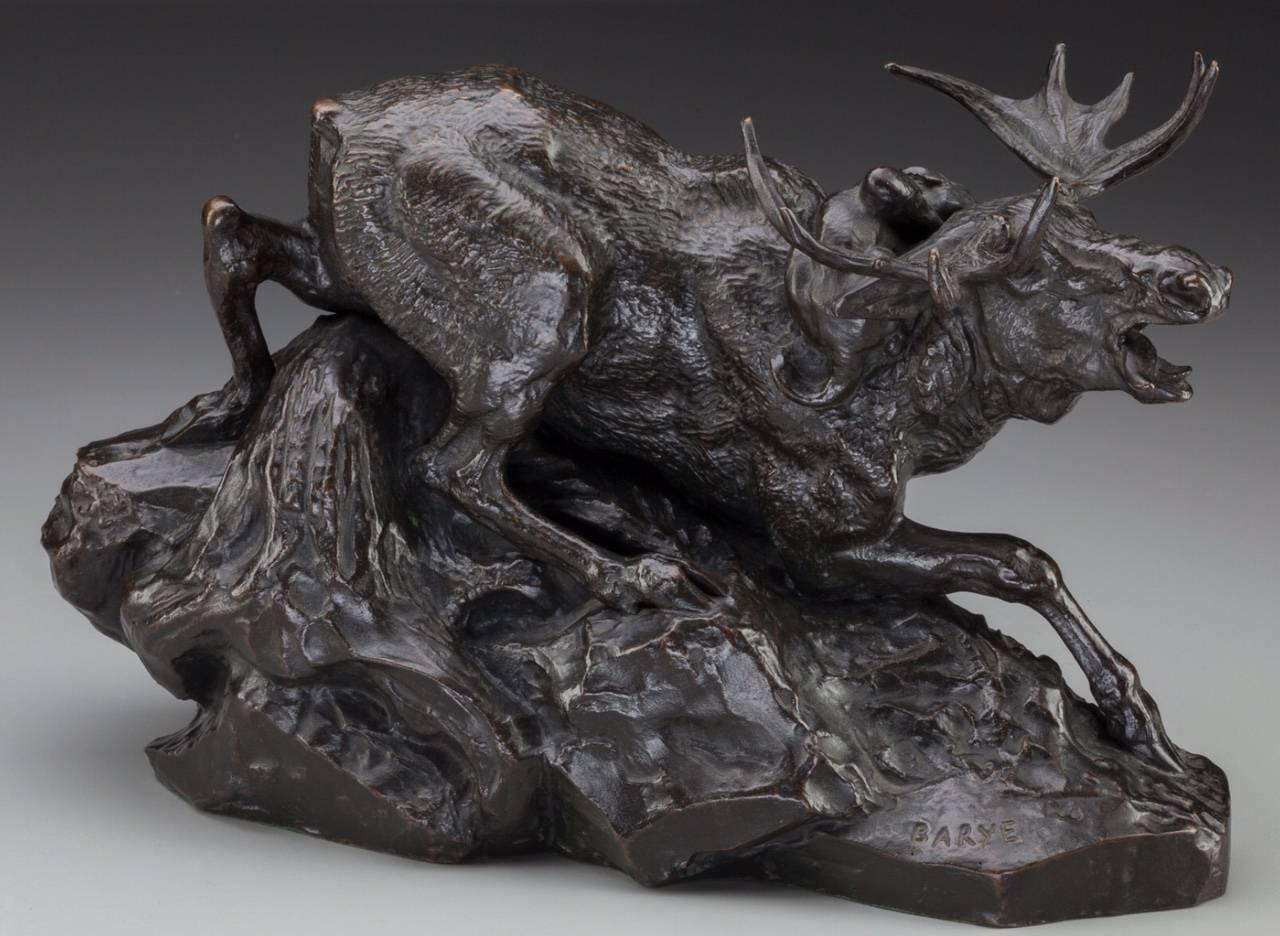
About the Seller
4.9
Gold Seller
Premium sellers maintaining a 4.3+ rating and 24-hour response times
Established in 2000
1stDibs seller since 2015
444 sales on 1stDibs
Typical response time: 12 hours
- ShippingRetrieving quote...Shipping from: Dallas, TX
- Return Policy
Authenticity Guarantee
In the unlikely event there’s an issue with an item’s authenticity, contact us within 1 year for a full refund. DetailsMoney-Back Guarantee
If your item is not as described, is damaged in transit, or does not arrive, contact us within 7 days for a full refund. Details24-Hour Cancellation
You have a 24-hour grace period in which to reconsider your purchase, with no questions asked.Vetted Professional Sellers
Our world-class sellers must adhere to strict standards for service and quality, maintaining the integrity of our listings.Price-Match Guarantee
If you find that a seller listed the same item for a lower price elsewhere, we’ll match it.Trusted Global Delivery
Our best-in-class carrier network provides specialized shipping options worldwide, including custom delivery.More From This Seller
View AllFrancoise Emile Decorchemont Pate De Verre Mold of a Woman’s Face
By Francois Decorchemont
Located in Dallas, TX
François-Emile Decorchemont Pate-de-Verre Glass Mold Of A Female Ladies Face. A rare, large and very heavy sculpture of either a mask or a modeled face. At 3.5 inches thick in glass with a peach, pink or rose color; this statue was exhibited in the Brooklyn Museum, New York in 1971. With much research; I haven’t seen or heard of a similar form by Decorchemont. The original Brooklyn Museum loan sticker is on verso with the Decorchemont stamp on her left cheek. For serious collectors or rare Art Deco, Art Nouveau glass.
Circa 1910
Molded Signature DECORCHEMONT
Height: 7 Inches (13.3 cm)
Width:. 5.2 Inches (16.5cm).
AVANTIQUES is dedicated to providing an exclusive curated collection of Fine Arts, Paintings, Bronzes, Asian treasures, Art Glass and Antiques. Our inventory represents time-tested investment quality items with everlasting decorative beauty. We look forward to your business and appreciate any reasonable offers. All of our curated items are vetted and guaranteed authentic and as described. Avantiques only deals in original antiques and never reproductions. We stand behind our treasures with a full money back return if the items are not as described.
François-Emile Décorchemont French, 1880-1997
François Décorchemont, originally an accomplished painter and potter of recognized ability, turned to the making of glass in 1904. Pâté de verre was the medium in which he excelled and for which he is best known. After studying decorative art in Paris, François Décorchemont returned to his native Conches in 1910 to develop new techniques in stained glass, particularly in the use of crystal to give multicolored and faceted panes. After 1909, while continuing to produce fine glass paste pieces, Francois Decorchemont began to experiment with a new casting technique. François Decorchemont, Emile's son and also an artist, helped out in his father’s studio, in particular helping him to research the possibilities of creating jeweled adornments in pates d'email (enamel pastes) for Gerome's polychrome sculptural creations.
Francois Décorchemont, a potter and painter at the outset of his career, became fascinated with the IDEA of developing and utilizing a thin translucent glass material in his work. It was in essence the revival and an adaptation of a long forgotten Egyptian glass-making process using colored crystal powdered glass, metallic oxides and an adhesive paste. This "new" material, known as pâte de verre was developed around the turn of the century, principally at the Sevres porcelain factory, by a number of artists working there, notably Henri Cros and Albert Dammouse.
The end of the 19th century was an illuminated period in the history of art. Impressionist painting appeared and created an interest in glass as material. Traditional sculpting materials such as bronze and marble made way for glass with its possibilities of light and color. Henry Cros and François Décorchemont became the leaders of French pâte de verre and facilitated the proliferation of this colorful glass. His first major work, in 1934, was inn the Eglise Sainte-Odile near Porte Champerret in Paris, some 300 square meters of brilliant colors. After the war, he devoted his work to churches in the Eure, including of course Beuzeville where, thanks to the generosity of the local council, the church is lit at night so that his work can be admired from outside. During the first half of the 20th century a number of French artists became famous for their work in pâte de verre, and Francois Decorchemont among them. March 2014, 20th Century’s Greatest Art Dealer Felix Marcilhac’s Collection Privee at Sotheby’s - Chang Yi Entrusts Antoine Leperlier in the Bidding of a Francois Decorchemon's Original. It has been reported that Felix Marcilhac’s Collection Privee auction at Sotheby’s brought in 33,125 Euros (28,000 RMB), three times the estimated price. Marcilhac is considered the greatest Art Deco dealer...
Category
Vintage 1910s French Art Deco Figurative Sculptures
Materials
Art Glass
Gabriel Argy Rousseau Pate De Verre Knight
By Gabriel Argy-Rousseau
Located in Dallas, TX
Gabriel Argy-Rousseau Pâte de Verre Chevalier Paperweight, Circa 1920 Art Nouveau - Art Deco period mottled glass is shades of red, pink, orange and purpl...
Category
Antique Early 1900s French Art Nouveau Figurative Sculptures
Materials
Art Glass
Song to Ming Dynasty Cast Iron Daoist Buddhist Head
Located in Dallas, TX
Daoist sage, official, or possibly a Buddhist acolyte.
A large, thick and heavy cast iron statue of a head. Custom vintage carved hardwood stand finishes off this outstanding and decorative bust, circa 10th...
Category
Antique 15th Century and Earlier Chinese Ming Busts
Materials
Iron
Emile Antoine Bourdelle Enfan
By Émile Antoine Bourdelle
Located in Dallas, TX
Emile Antoine Bourdelle (French, 1861-1929) Bronze Sculpture
Bronze brutalist bust titled Enfant Riant (Laughing Child) Most probably modeled by his daughter; Rhodia. Bourdelle was...
Category
Vintage 1910s French Figurative Sculptures
Materials
Bronze
Francois Decorchemont Pate De Verre Art Deco Paperweight
By Francois Decorchemont
Located in Dallas, TX
Francois Decorchemont Pate-de-Verre Chameleon Paperweight sculpted with orange and clear bubbled glass. Francoise Decorchemont pioneered the pate de Verre industry in the turn of the...
Category
Vintage 1920s French Art Deco Natural Specimens
Materials
Art Glass
Emile Antoine Bourdelle “Arlequin” Bronze Sculpture Valsuani Foundry
By Émile Antoine Bourdelle
Located in Dallas, TX
Emile Antoine Bourdelle (French, 1861-1929) Bronze Sculpture
L' Arlequin.
Conceived in 1905 and cast around 1954
A rare museum quality impressionist - Brutalist interpretation of a harlequin swordsman in bronze with black/brown patina.
Bears the cast signature E. A. BOURDELLE top of the base, © by Bourdelle along one side.
Foundry seal of A. VALSUANI CIRE PERDUE. On corner.
Measures 16 x 16.5 x 5 inches.
Very good condition throughout, no damage, repair or heavy wear. Scratches and wear to patina throughout commensurate of material age and use.
Provenance: The estate of Morton and Estelle Sosland.In Kansas City, the Sosland family name is synonymous with both giving, and the arts. Of their many contributions to the community, 'The Soslands gave one of the nation's finest private collections of American Indian art to the Nelson-Atkins' museum. The content of this auction bears testament to their keen eye and varied interests.
In September 1893 Bourdelle joined the studio of Auguste Rodin. His collaboration with Rodin lasted fifteen years. In 1895, he received his first official commission, a war monument for the city of Montauban. His proposed plans, different from traditional monuments, created a scandal. Rodin intervened on his behalf, and the monument was finally erected in 1902.
In 1900, Bourdelle demonstrated his independence from Rodin's style with a bust of Apollo. In the same year, Bourdelle, Rodin and the sculptor Desbois opened a free school of sculpture, the Institut Rodin-Debois-Bourdelle. One of the students was Henri Matisse, who later produced some remarkable sculpture, but the school did not last long.
Bourdelle in his studio sketching Grace Christie
In 1905, Bourdelle had his first personal exhibition, in the gallery of the foundry-owner Hébrand. With the support of Hébrand and the material assistance of his foundry, Bourdelle was able to make larger works and earn greater recognition. His father died in 1906, and Bourdelle changed his first name to simply Antoine, after his father. He married his second wife, Cléopatre Sevastos (1892-1972), who was of Greek origin. She and their daughter, Rhodia, became a frequent inspiration for his works.[6]
In 1908, Bourdelle left the studio of Rodin and set out on his own. In 1909 he exhibited a new work, Hercules the Archer at the annual Salon of the Societé Nationale des Beaux-Arts. He began to teach at the Académie de la Grande Chaumière, where his students included Giacometti, Isaac Frenkel and Adaline Kent...
Category
Vintage 1940s French Brutalist Figurative Sculptures
Materials
Bronze
You May Also Like
French Modern Glazed Terracotta Face Mask Sculpture
Located in Houston, TX
French Modern Glazed Terracotta Face Mask Sculpture
This 20th Century French Modern tribal style glazed terra cotta face mask sculpture is well exe...
Category
20th Century French Tribal Figurative Sculptures
Materials
Terracotta
French Art Deco Terracotta Face Mask Sculpture
Located in Houston, TX
French Art Deco Terracotta Face Mask Sculpture.
Our French Art Deco terra cotta sculpture can be displayed on a wall mounted or placed on a flat surface ...
Category
Vintage 1930s French Art Deco Figurative Sculptures
Materials
Terracotta
art deco ceramic mask circa 1930/1950, monogram, to identify
By Colette Gueden
Located in Saint-Ouen, FR
art deco ceramic mask circa 1930/1950, monogram, to identify
Category
Mid-20th Century French Art Deco Figurative Sculptures
Materials
Ceramic
Art Nouveau Stoneware Commedia Dell’arte Mask by Pierre-Adrien Dalpayrat
By Pierre-Adrien Dalpayrat
Located in Chicago, US
Exploring new firing and glazing techniques and their myriad effects on traditional forms was an exciting approach for many experimental turn-of-the-century ceramists. Here the acid ...
Category
Antique 1890s French Art Nouveau Figurative Sculptures
Materials
Stoneware
Mid century French ceramic wall mask, 1950s
By Accolay Pottery
Located in STRASBOURG, FR
Glazed earthenware mask circa 1950, with a beautiful turquoise glaze that varies in texture. Signature on the back similar to those of Accolay.
In very good condition.
Category
Vintage 1950s French Mid-Century Modern Wall-mounted Sculptures
Materials
Ceramic
Continental German Terra-Cotta Mask
Located in Queens, NY
Continental German (late 19th cent) sculpted terra-cotta master mask mold of a laughing Grotesque face with glasses and pointed teeth displayed on a square black marble base stand (p...
Category
Antique 19th Century German Other Busts
Materials
Marble
More Ways To Browse
Pan Light
Bronze Pan
1910 Stained Glass
Bronze Verre
Daum Pate De Verre
Art Deco Lighted Glass Sculpture
Art Deco Pate De Verre
Daum Pate De Verre Art Glass
Daum France Art Glass Pate De Verre
Goat Horns
Tiffany Stained Glass
Sevres Art Deco
Horns Decorative Stand
Pan Stand
Bronze Sculpture Goat
Tiffany 1997
Egypt Mask
Antique Egyptian Glass
